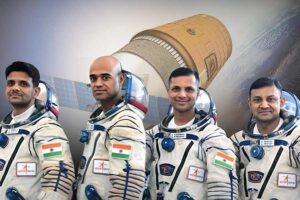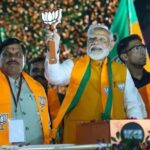Group Captain Prasanth Balakrishnan Nair, Group Captain Ajit Krishnan, Group Captain Angad Pratap, and Wing Commander Shubhanshu Shukla have been named India’s astronauts-designate for Gaganyaan, the country’s first crewed space mission, Prime Minister Narendra Modi announced on Tuesday.
The four Indian Air Force officers have vast expertise as test pilots and are now training for the assignment. Modi, who presented them with the famous astronaut wings, referred to them as “four forces” who embody the hopes and optimism of 1.4 billion Indians.
The news came at the Vikram Sarabhai Space Centre in Thumba, Kerala, just a few days after the Indian Space Research Organisation (ISRO) announced that the cryogenic engine that will power the Gaganyaan mission vehicles had been successfully tested for human readiness. The first mission flight, Gaganyaan-1, an unmanned test flight to ensure technology readiness, is scheduled until the end of 2024. The human mission, which will launch a three-person crew into a low-earth orbit at 400 km height and return to Earth after three days, will follow.

Wing Commander Rakesh Sharma became the first Indian in space in 1984, flying to the Salyut 7 space station aboard a Soviet spacecraft. In 2006, India began work on an orbital vehicle mission known as Gaganyaan. As the astronauts-designate are named, below are the mission’s many features. ISRO will employ the LVM3 rocket for all Gaganyaan missions. LVM3, previously known as GSLV-MkIII, is the Indian space agency’s most powerful launch vehicle, having flown seven times without failure. The rocket consists of three stages: liquid, solid, and cryogenic.
ISRO has changed all LVM3 components to meet human rating standards. On February 14, final tests on the cryogenic engine, known as CE20, were carried out. The engine passed the test and was approved for missions that would deliver humans into space.
The Vikas engine, which will power the liquid stage, and the solid booster, which is part of the solid stage, have already qualified for the missions.
The special flight engine, which fires as the rocket takes off, has passed acceptance testing. These tests certify/qualify the hardware’s test performance based on the mission requirements. The technology or development is then used for the final mission.
The crew module and escape system
Preparations for human space flight include the development of life support systems to provide an Earth-like environment for the crew in space, emergency escape plans, and evolving crew management components for training, recovery, and rehabilitation.
ALSO READ: The Lincoln Lawyer Season 3: Trailer, Cast, Release Date, and Everything Else to Know
Precursor missions, such as Gaganyaan-1, will demonstrate the level of technological readiness before to the manned expedition. The unmanned mission will transport an unpressurised crew module—the capsule in which the astronauts would sit during the human flight—to and from space. The Gaganyaan-1 mission’s crew module will lack the Environment Control and Life Support System, which maintains an Earth-like environment within the module. ISRO is currently developing and testing numerous system components in its labs.
“It (Gaganyaan-1) will mainly test the safe re-entry of the crew module and proper orientation of the module when it splashes down in the sea,” a spokesperson for the ISRO said.
A second unmanned trip with a pressurized crew module is planned, and the entire life support system will be tested. This flight will contain the robot Vyommitra, which will record all parameters to investigate the flight’s influence on humans.

The schedules for these missions are not yet finalized. “For previous launches, we already know the route, making planning easier. For this expedition, everything is fresh, and each test reveals what worked and what did not. “We have to keep making adjustments as we go,” the ISRO official stated. Last October, ISRO successfully tested the first basic crew module and crew escape system (CES). The CES is a component of the module that ensures “the crew is taken to a safe distance in case of any emergency either at the launch pad or during the ascent phase,” according to ISRO.
Modi
Drogue chutes play an important function in stabilizing the crew module and lowering its velocity during re-entry. They lower the crew module from a height of 17 km and a speed of 150 metres per second to 2.5 km from the sea surface at a speed of 63 metres per second.
ISRO has also been testing a crew module uprighting device, which ensures that the module stays upright after splashing down in the sea.
Training of astronauts
From February 2020 to March 2021, the four astronauts received generic training at Russia’s Yuri Gagarin Cosmonaut Training Centre. In June 2019, ISRO signed a Memorandum of Understanding with Glavkosmos, a subsidiary of the Russian space agency Roscosmos, for training purposes. The astronauts are now undergoing training at ISRO’s astronaut training center in Bangalore. “Training is constant. They are now being trained on subsystem functionality using various subsystem simulators. They are involved in the development of the crew module design because they can identify what is pleasant, what works, and so forth,” stated an ISRO official.
“The astronauts also have to continuously undergo fitness and psychological training,” the person went on to say.
One of the four astronauts is anticipated to be trained by NASA, the American space agency. Bill Nelson, NASA administrator, made the news during a visit to New Delhi in 2023. According to The Indian Express, this astronaut will most likely be chosen from among the four currently prepping for the Gaganyaan mission.
ALSO READ: ZEE NEWS-MATRIZE OPINION POLL: PM MODI LED NDA VS INDI ALLIANCE—WHO WILL WIN?














